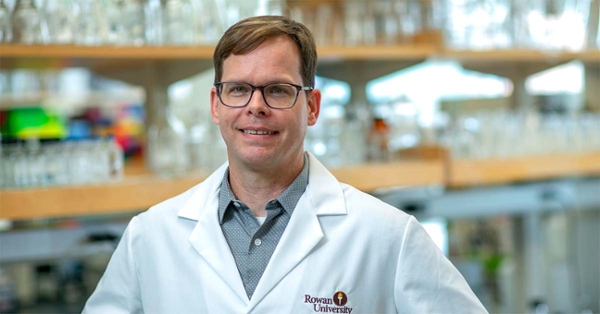NSF CAREER Award: Rowan bacteriologist explores how the ‘original genetic engineer’ infects plants
NSF CAREER Award: Rowan bacteriologist explores how the ‘original genetic engineer’ infects plants

When crops suffer from blight, wilt and soft rot, bacterial infections are usually to blame.
“Just like humans, plants get sick,” said Jason Heindl, Ph.D., assistant professor in the Department of Biological & Biomedical Sciences at Rowan University’s College of Science & Mathematics.
Heindl recently secured a $520,000, five-year National Science Foundation (NSF) Faculty Early Career Development (CAREER) Award to study bacteria that cause diseases in plants. He plans to explore how one type of plant-infecting bacteria, Agrobacterium, grows and develops—and how humans can manipulate this process and its outcome.
In the microbiology community, Heindl said, Agrobacterium has earned the nickname “the original genetic engineer.” Long before human scientists began genetically modifying organisms, these bacteria were genetically engineering plant tissue all on their own.
The bacterium transfers some of its own genome to the plant host and causes it to grow a neoplasm comparable to a tumor in humans. The condition is called crown gall disease and the tumors are called “galls.”
The galls won’t kill the plant. This outgrowth of abnormal tissue provides a food source for the bacterium. Agrobacterium needs its host to remain alive in order to keep producing this food. Because the plant is forced to divert resources to feed bacteria instead of its own growth, the infection still negatively affects the host.
For Heindl, Agrobacterium colonization presents an opportunity.
“It’s like drug discovery for plants,” Heindl said. “We can remove genes that negatively impact plant fitness and add genes for a positive impact, so Agrobacterium engineers a better crop that contains more nutrients or is able to better survive drought or disease.”
These applications could lead to more robust food production, ease the economic strain poor crop yields put on farmers and produce more of the ingredients used in vaccines and biomedical products.
Before Heindl can start using Agrobacterium’s natural genetic engineering capabilities as a tool for building better plants, he needs to better understand how the bacterium exploits the new environment of the host plant. That means studying the bacterial cell cycle and detailing, at the genetic and molecular levels, regulatory pathways through which Agrobacterium interacts with the host plant.
“What genes change when Agrobacterium realizes it’s in a different environment?” Heindl said. “How do they change? And how is the regulation of the cell cycle relevant to the transformation Agrobacterium causes in the plants it infects?”
To Heindl’s knowledge, this is the first time a researcher is directly studying how bacterial cell cycle regulation relates to how Agrobacterium infects host plants.
At least two graduate and two undergraduate students per year will work on this project in Heindl’s lab beginning September 1, 2023. Indirectly, even more students will contribute to the project through a course-based undergraduate research experience Heindl is teaching and a summer STEM Scholars outreach program involving affiliated community colleges.
With Heindl’s grant—the fifth Rowan faculty have received this spring—the University has seen a record number of NSF CAREER Awards granted in a single year.
“Dr. Heindl’s CAREER Award project will make a significant contribution to understanding cell cycle changes in this common plant pathogen which causes serious economic and crop losses worldwide,” said Vojislava Pophristic, Ph.D., dean of the College of Science & Mathematics. “In addition, his project lays out a framework for integration of research and educational efforts with special attention to underrepresented students and students transferring from Rowan-affiliated community colleges. It will propel Rowan’s contributions to national challenges in bacterial diseases, agriculture, and sustainability.”